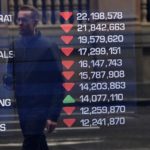 The coronavirus pandemic has caught all of us unaware, and while predictions from institutions as august as the WEF at the start of the year have been blindsided by the pandemic, we should not diminish the importance of forecasting. New research from the International Institute for Applied Systems Analysis explores whether we might be able to accurately forecast pending recessions.
The coronavirus pandemic has caught all of us unaware, and while predictions from institutions as august as the WEF at the start of the year have been blindsided by the pandemic, we should not diminish the importance of forecasting. New research from the International Institute for Applied Systems Analysis explores whether we might be able to accurately forecast pending recessions.
While recessions have varying duration and intensity there are sufficient telltale signs to render them predictable. For instance, the researchers identify clear adjustments to the economy at the aggregate level, which then influences the length of the recovery period seen in an economy. The authors suggest that after the financial crisis of 2008, there was an 85% chance that the next recession would start before 2020.
The researchers developed a diagnostic model to estimate the duration of both the expansionary periods, and the oncoming recession in any business cycle. The data shows that the length and depth of recessions has a clear link on the time between these two events.
“Recessions do not feature any regular periodicity and this statistical study tried to understand how corrective actions like market adjustments, stimulus packages, regulations of the financial sector, and trade reforms, affect the arrival times of new recessions. Our model accounts for the combined effect of these adjustment processes, as well as for the length and depth of previous recessions,” the researchers say.
Historical accuracy
The model was tested on a number of historical recessions in both the United States and Europe, and showed itself to be accurate in detecting the various adjustments in economic systems. The model was also able to do so across various different forms of economy with apparent ease.
For instance, the model suggests that adjustment processes were more profound in the US economy than they were in the European economies, which the researchers believe highlights the greater efficacy at dealing with recessions in America than in Europe.
“This suggests that closer integration of countries in the European Union, of which many share the same currency but no common fiscal policy, could allow for a more effective European response to future crises,” they explain.
The team hope that their model will be useful to policymakers and help them both plan for the future, and make the appropriate adjustments when changes to the economy emerge.